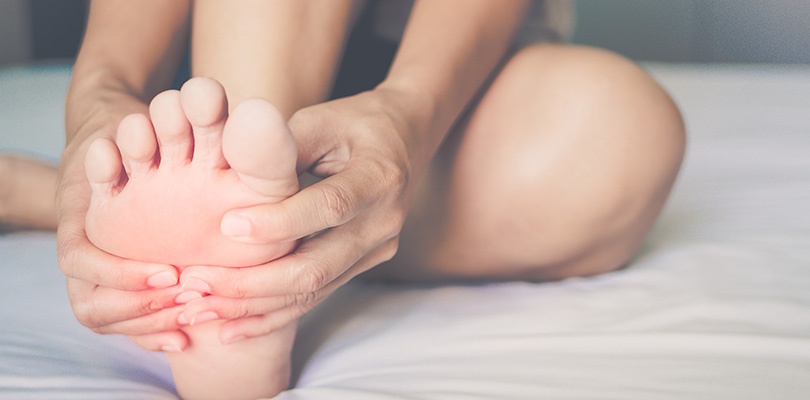Hot, Burning Feet? It Could be Burning Feet Syndrome
Falling asleep some nights can seem like the most difficult thing in the world. Sometimes your mind keeps you awake, but other times your body is responsible for keeping you up at night.
If your feet feel hot and you can’t figure out why – you might suffer from burning feet syndrome.
What Is Burning Feet Syndrome?
As the name suggests, burning feet is a sensation when your feet feel painfully hot. Also referred to as Grierson-Gopalan syndrome, burning feet can be mild to severe and is a common sensation.
The condition may come with the tingling feeling of pins and needles, numbness, or both. The feeling can affect your ability to sleep, keeping you awake because of the discomfort in your lower limbs.
Symptoms of Burning Feet Syndrome
There is generally no physical sign of burning feet syndrome.
Some causes may make the feet appear red and swell up, but this is not a common side effect of the condition. The burning sensation can also affect the lower legs and ankles, but the affected areas will not feel tender.
Heat sensations become more elevated at night time; a symptom that may be the result of blood flow in a reclined position. Depending on the severity of the burning feet, sweating may also be present.
What Causes Burning Feet Syndrome?
Generally, the cause of burning feet is the result of increased core temperature within our bodies. This heat enables more blood flow to our feet than when we’re feeling cold.
Burning feet occurs more commonly in people over the age of fifty and in diabetics, although it can affect anyone. This condition is more typical in women than in men.
There are many potential causes of this syndrome. Fatigue or a skin infection can cause the feeling of burning feet. Other possible causes are pregnancy, menopause, athlete’s foot, chronic kidney disease, hypothyroidism, gout, circulatory disorders, or chemotherapy.
If you’re on your feet all day, your feet will certainly ache or burn when you finally have a chance to recline. It can be a result of improper footwear.
Peripheral Neuropathy and Burning Feet Syndrome
Another explanation is nerve damage; a condition called peripheral neuropathy.
The peripheral nervous system transmits information from the central nervous system to the body through peripheral nerves. These nerves extend through your limbs, all the way down to your toes.
Damage to these nerves causes a variety of symptoms that can affect sensations such as temperature, muscle movement, and autonomic functions. Damage to the peripheral nerves may be permanent or temporary, and it can take months or years for the issue to go away.
Causes of peripheral neuropathy include diabetes, excessive alcohol use, metabolic problems, traumatic injury, exposure to some toxins, vitamin deficiencies or HIV infection.
Dealing With Hot Feet at Night
The warmth generated from the sensation of burning feet messes with our circadian rhythm (internal clock) and keeps us awake. Your core temperature starts to decrease a little bit at night to conserve energy.
The additional heat from daily activity typically exits out of our extremities. However, the position in which we sleep can impact the burning feet sensation and the ability to lower core temperature.
Elevating your feet reduces swelling and helps regulate blood flow to the lower limbs. Alternatively, some people have found sleeping with their head raised and legs below heart level also helped prevent the condition. You may want to try adjusting your sleep position to see if it alleviates the issue.
Treatment for Burning Feet Syndrome
Relief of burning feet syndrome depends on the cause of the condition.
- Avoid prolonged standing and if you experience swelling, try to put your feet up when you can.
- In some cases, it might be enough of a solution to merely uncover the feet from blankets or stick them in cool water to bring the hot sensation down.
- Some creams with menthol (or other cooling properties) can be applied to help relieve the sensation.
- Acupuncture and reflexology are good options if you don’t have an underlying disease.
- Your physician may elect prescribed medication to ease your symptoms as well.
Prevention
Take care of your feet. Change up your socks and opt for cotton over synthetic materials. Air out your shoes between wears. Don’t wear damp socks or shoes.
If you’re on your feet all day or overusing the muscles in your feet, be sure to get proper-fitting shoes with support and good airflow. Orthotics may be a good investment to help relieve the problem.
Podiatrists exist for a reason, if you’re having an issue not discernable by your general practitioner, schedule an appointment with a foot specialist. They will be able to offer alternative suggestions to relieve your burning feet.
Follow your prescribed treatment regimen, and you’ll be back on your feet in no time (without the burning sensation!).
